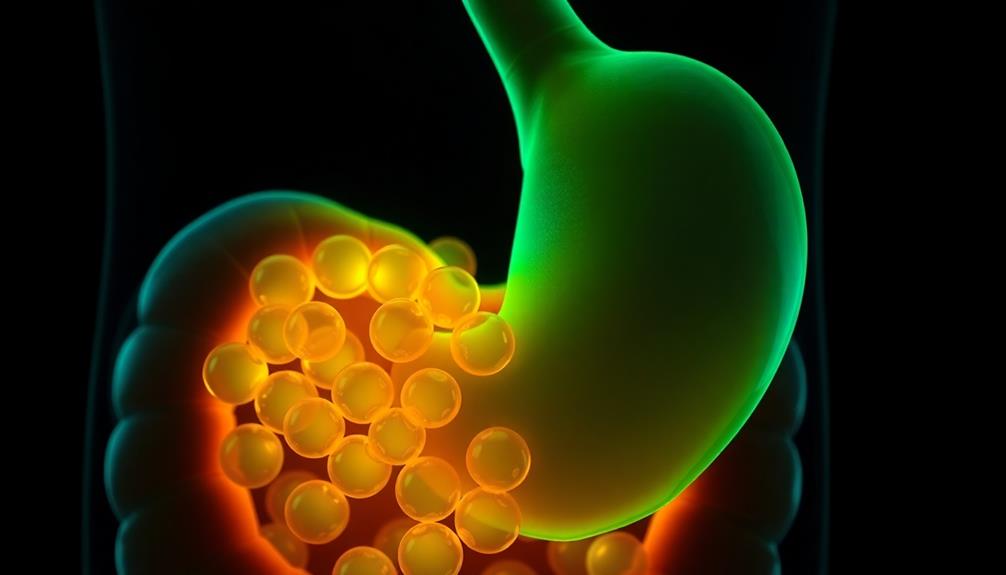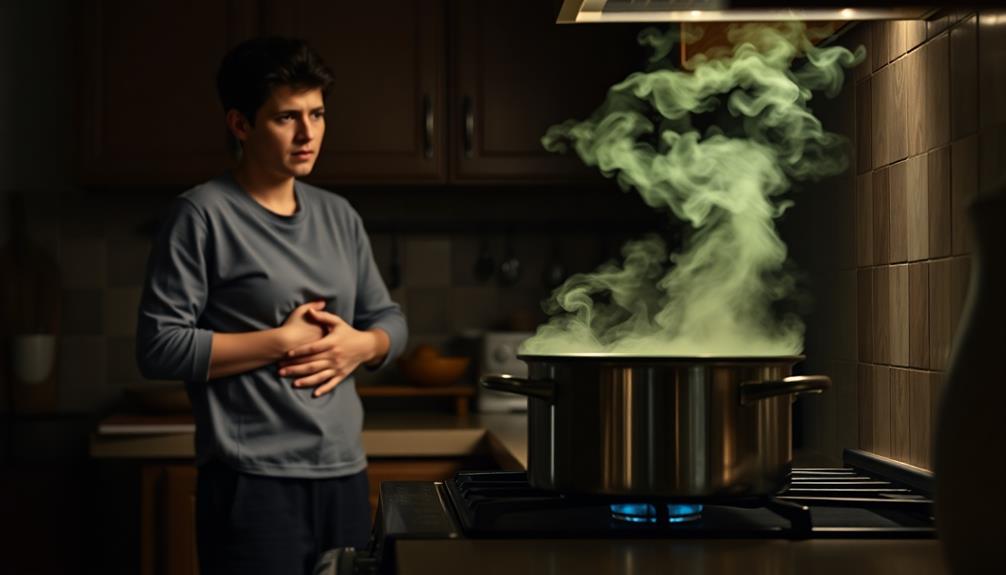If your burps smell like rotten eggs, it usually means your body's producing hydrogen sulfide gas. This often happens when you eat sulfur-rich foods like garlic, onions, or eggs. Sometimes, it could also signal digestive issues, such as an imbalance in your gut bacteria or conditions like Irritable Bowel Syndrome (IBS). Eating too quickly, or having carbonated drinks can make it worse, too! While occasional sulfur burps aren't a huge deal, frequent ones might mean it's time to chat with a doctor. Keep an eye on your diet for more clues about what's going on!
Key Takeaways
- Burps that smell like rotten eggs are often due to the presence of hydrogen sulfide gas from sulfur-rich foods like garlic and onions.
- Gastrointestinal issues such as Irritable Bowel Syndrome (IBS) or Small Intestinal Bacterial Overgrowth (SIBO) can lead to increased sulfur burps.
- An imbalance in gut flora, often caused by antibiotics, can result in higher hydrogen sulfide production during digestion.
- Frequent sulfur burps may indicate underlying health concerns and should be evaluated by a healthcare professional.
- Keeping track of dietary intake can help identify trigger foods contributing to sulfur burps.
Introduction

You might occasionally notice that your burps smell like rotten eggs, and while it can be unpleasant, it's often a sign of what's happening in your digestive system.
These sulfur burps are primarily caused by hydrogen sulfide gas, which your body produces when digesting sulfur-containing foods like garlic, onions, and cruciferous vegetables. If you find yourself dealing with these odd burps often, it could point to gastrointestinal issues like Irritable Bowel Syndrome or Small Intestinal Bacterial Overgrowth.
Sometimes, medications, including antibiotics and Ozempic, can upset your gut flora balance and lead to more hydrogen sulfide production. Along with sulfur burps, you might experience bloating, gas, or abdominal discomfort.
If these symptoms hang around or worsen, it's a good idea to seek a medical evaluation.
Don't worry, though! Dietary modifications can help you feel better. Reducing your intake of sulfur-rich foods and steering clear of carbonated beverages can improve your overall digestive health.
Description of the Smell

The smell of burps resembling rotten eggs is unmistakable and often alarming. You might wonder why this happens! This foul odor comes from a gas called hydrogen sulfide, which is produced in your digestive system.
When you eat foods rich in sulfur, like garlic, onions, or broccoli, they break down and release this gas, making your burps smell like rotten eggs.
It's interesting to note that gut bacteria play a big role, too! Sometimes, an imbalance in these bacteria can lead to more sulfur burps.
If your burps are frequent or come with other digestive issues, it could mean something more serious. In those cases, a medical evaluation might be a good idea to check for any underlying health conditions.
Source and Composition

Many factors contribute to the source and composition of burps that smell like rotten eggs. One main reason is hydrogen sulfide gas, a stinky byproduct produced when gut bacteria break down sulfur-containing foods. You might notice these sulfur burps after eating foods like garlic, onions, or even eggs and meat. These tasty treats contain sulfur, which can lead to more gas production in your gastrointestinal tract.
When your body has trouble digesting food, such as with digestive disorders or small intestinal bacterial overgrowth (SIBO), things can get even smellier. If undigested food sits around, bacteria ferment it, creating more hydrogen sulfide gas. This process can make those burps even more frequent and, let's be honest, unpleasant! Additionally, certain underlying health conditions, like **diabetes and unusual sweat odor**, may also contribute to changes in body scent and gas. When metabolic processes are out of balance, the body can produce distinct smells as a byproduct, further complicating issues caused by poor digestion. Keeping tabs on these symptoms can be important for identifying potential health concerns early on.
Everyone's gut microbiota is unique, which means your body's bacterial breakdown varies from someone else's. This individuality affects how much gas you produce and can explain why some people experience sulfur burps more than others.
Typical Scenarios or Environments

Sulfur burps often pop up in specific scenarios or environments that can enhance their frequency and intensity. You might notice these burps, with their rotten egg smell, after enjoying sulfur-rich foods like garlic and onions.
If you're eating quickly or chatting while you munch, you could be swallowing excess air, which adds to the problem. Stressful situations, like exams or deadlines, can also upset your digestive tract, making these burps more likely.
Additionally, if you've been dealing with gastrointestinal infections caused by pesky bacteria in the gut, like Helicobacter pylori or Giardia, you may find yourself facing more sulfur burps.
Social gatherings can be tricky too! Sipping on carbonated beverages or alcohol can increase gas buildup, leading to those smelly eruptions.
Don't forget, dietary changes can play a role in how often you experience these burps. If you've switched up your meals recently, your body might need time to adjust.
If sulfur burps become a regular thing, it could be a sign of an underlying condition. So pay attention to your body and what you eat!
Emotional or Cultural Associations

Experiencing sulfur burps can stir up a mix of emotions and cultural perceptions. You might feel embarrassed or even disgusted when those rotten egg smells pop up, especially in social situations. Many people associate these sulfur burps with poor hygiene or health issues, which can create a cultural stigma. This stigma can make you feel anxious or ashamed, especially if you're out with friends or family.
Interestingly, in some cultures, like certain Asian traditions, burping after a meal is seen as a compliment to the chef. This belief shows how cultural views can shape the way we feel about digestive health.
If you find yourself experiencing sulfur burps, your emotional reactions could affect your confidence and social interactions. It's easy to worry that others might judge you for what's happening in your body.
Some might even think of sulfur burps as signs of dietary indiscretion or an imbalance in their digestive health. Remember, it's important to understand that everyone has gastrointestinal symptoms from time to time.
Embracing your body's natural processes, even the stinky ones, can help you feel more relaxed in social settings!
Health or Safety Considerations

Digestive health is crucial for overall well-being, and persistent sulfur burps can be a warning sign that something's amiss. When your burps smell like rotten eggs, it often means hydrogen sulfide is being produced in your gut. This gas can come from the breakdown of sulfur-rich foods in your diet.
While it might seem funny, frequent sulfur burps can signal underlying gastrointestinal disorders like Irritable Bowel Syndrome (IBS) or Small Intestinal Bacterial Overgrowth (SIBO). If you notice other symptoms, such as abdominal pain or weight loss, it's time to seek a medical evaluation. These could indicate more serious conditions that need attention.
Lifestyle factors, like stress and certain medications, can make sulfur burps worse too. Paying attention to your dietary intake is essential. You might've trigger foods that lead to these smelly burps. Keeping track of what you eat can help you find patterns and improve your digestive health.
If you're feeling concerned, don't hesitate to talk to a healthcare professional. They can help you identify the underlying cause and guide you towards feeling your best!
Final Thoughts

Managing burps that smell like rotten eggs can feel frustrating, but understanding their cause is the first step toward relief. Those sulfur burps happen when hydrogen sulfide gas builds up during digestion, especially after eating sulfur-rich foods like garlic and broccoli.
If you notice frequent burps, it might point to gastrointestinal issues. You could also feel bloated or experience abdominal pain, which calls for a check-up to rule out any underlying medical conditions.
Don't worry! There's hope. You can make dietary modifications, like cutting back on those sulfur-rich foods and drinking more water. This simple change can help ease your symptoms.
Additionally, over-the-counter medications might help with gas buildup, and taking probiotics can work wonders for your gut microbiome. These little helpers can boost your digestive health and make you feel better overall.
Frequently Asked Questions
Should I Be Worried if My Burps Smell Like Rotten Eggs?
If your burps smell like rotten eggs, it's worth paying attention. While occasional occurrences might not be serious, persistent smells could signal digestive issues. Consider consulting a healthcare professional if you're concerned or experience other symptoms.
How Do You Get Rid of Eggy Burps?
To get rid of eggy burps, try cutting sulfur-rich foods from your diet and drink plenty of water. Eating smaller meals and incorporating probiotics can also help balance your gut and reduce gas production effectively.
Do Sulfur Burps Mean I'm Sick?
Sulfur burps don't always mean you're sick. They can result from dietary choices or digestive issues. If you notice them frequently or with other symptoms, it's smart to consult a doctor for further evaluation.
What Is the Virus That Causes Eggy Burps?
There isn't a specific virus causing eggy burps. Instead, it's often due to hydrogen sulfide produced during digestion, influenced by certain foods, bacterial overgrowth, or gastrointestinal disorders. You might want to review your diet and health.









